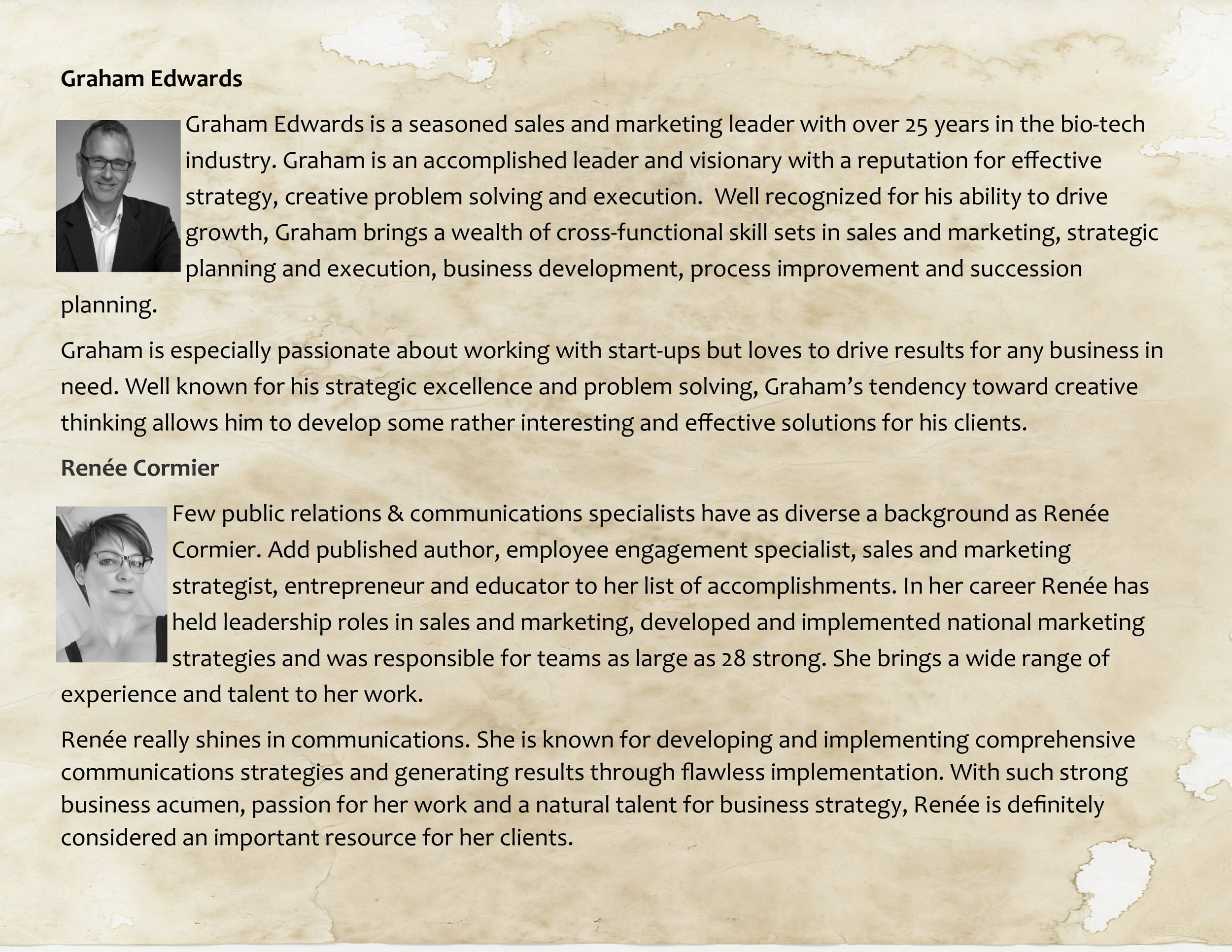This is the final in a series of thoughts and opinions by Graham Edwards and Renée Cormier — click here to read the backstory and inspiration (if only for the entertainment). It should be noted that neither of us have seen or discussed our answers before they are posted, which in our mind makes this all the more interesting.
In this blog series we will attempt to answer ten different questions business owners may need answered, using our individual and unique perspectives and approaches. It is our hope that this series will inspire both action and interaction. Please feel free to comment and ask more questions.
Graham —
I know Renée will be very enthusiastic about this question and have great things to say — I on the other hand see social media as an evil necessity and still somewhat struggle with it.
It wasn’t so long ago that I saw social media as nothing more than voluntarily relinquishing of our privacy, and self-righteously made a stand not to get involved — I would hold onto my privacy with my last dying breath (or the illusion of doing so). And then one day I heard Gary Vaynerchuk speak, and he said something profoundly simple.
He said, “Privacy is dead.”
If you have not heard of Gary Vaynerchuk he is arguably “THE EXPERT” on social media and using it to grow your business (particularly if you an entrepreneur). I encourage you to read his books (and watch his videos) if you are interested in understanding the impact and utility of social media in all its forms.
With the recognition that sadly his assertion was correct, I welcomed social media in, embraced it, and adopted the illusion that I would at least try to control it for my own branding and messaging — and with that preamble down on paper let’s start with a definition.
This is how Wikipedia defines Social media —
The variety of evolving stand-alone and built-in social media services introduces a challenge of definition. The idea that social media are defined by their ability to bring people together has been seen as too broad a definition, as this would suggest that the telegraph and telephone were also social media – not the technologies scholars are intending to describe. The terminology is unclear, with some referring to social media as social networks.
A 2015 paper reviewed the prominent literature in the area and identified four commonalities unique to then-current social media services:
1. Social media are Web 2.0 Internet-based applications,
2. User-generated content (UGC) is the lifeblood of the social media organism,
3. Users create service-specific profiles for the site or app that are designed and maintained by the social media organization,
4. Social media facilitate the development of online social networks by connecting a user's profile with those of other individuals or groups.
In 2016, Merriam-Webster defined social media as "Forms of electronic communication (such as Web sites) through which people create online communities to share information, ideas, personal messages, etc."
And this definition manifests itself in websites, Facebook, YouTube, Pinterest, Twitter, beBee, LinkedIn, Snapchat, Instagram, Medium, Tumblr, et cetera — all available for you to get involved with 24/7, 365 ¼ days a year.
It’s probably best to break this question into three sections —
The first section: Do I need to be using Social Media?
The second section: What Social media should I use?
The third section: How much do I really need to do?
The first section to the answer of the tenth and final question
Your need to use Social media is completely dependent on your business objectives, the type of business you have, and what your overall marketing plan looks like. I suppose technically (in this day and age) you don’t have to use social media but I will admit I struggle to think of a business situation where some sort of social media wouldn’t come into play. I think the question you should ask is why wouldn’t you get involved with social media? For example, if you sell a product of any kind, at the very least, you will have to set up a website — (thanks to Amazon) people now like to order on-line from the comfort of their bedroom.
So the answer to this section is yes you should be using social media (with some important considerations). As an aside, if you are actually able to come up with reasons your business shouldn’t engage in social media I would be very curious as to the reasons — please let me know.
The second section to the answer of the tenth and final question in a series of questions by Renée and Graham
This section starts to touch on some of the considerations I alluded to above. What social media you use will depend on which social media will communicate your message most effectively (and this will be very dependent on the type of business you have). You also need to look at social media “holistically”, and not as individual platforms that operate independently; it is important to view social media platforms as pieces that make up the whole of your social media activity which actively complement, engage, and play off of each other (as well as your more traditional marketing channels). I believe it is important to understand your branding strategy and the networks you are looking to develop, and how you will use your social media to engage potential customers. It is imperative to understand that social media is not simply a new marketing channel to statically push your message through but rather an opportunity to initiate a dialogue and have a conversation with your customer.
My suggestion would be to start with three social media platforms when you develop your social media strategy and be prepared to participate — get really good at it, learn, and expand from there. THERE IS A TRUSIM THAT IS BECOMING QUITE APPARENT AND IT GOES SOMETHING LIKE THIS: IT IS BETTER TO HAVE NO SOCIAL MEDIA CHANNELS THAN ACTIVATE SOCIAL MEDIA CHANNELS THAT ARE NEVER USED — SETTING UP A COMPANY FACEBOOK PAGE, A TWITTER ACCOUNT, LINKEDIN, INSTAGRAM, ETC AND NOT USING THEM DOES NOT A SOCIAL MEDIA STRATEGY MAKE.
The third section to the answer of the tenth and final question in a series of questions by Renée and Graham to Help You Mind Your Business
I’ve noticed there is a chain of events that occurs with the adoption of social media —
The realization (sometimes grudgingly) that social media is needed to move the business forward (and more often than not, there is also the belief that you don’t really have to understand it — just pretend that you do).
A saving grace perception occurs that the upfront costs are low and the costs can be kept low by giving it to someone who is young and “knows this stuff” — then it’s hands off.
Leadership takes a top shelf position as they try to understand what is happening, question why it doesn’t seem to be working, and asking that ever popular question, “Where’s the ROI?”
My experience is this chain of events tends to lead to static social media channels, no integration with other channels (or brand messaging), and the eventual reallocation of resources for something else (that more often than not isn’t very customer engaging).
So to the question of how much do you really have to do?
YOU NEED TO GO ALL IN and ensure any social media you use is as active as possible (forever creating dialogue with your network).
Leadership needs to truly understand the value of social media and the degree it wants to adopt social media—strategy and guidelines for the social media channels need to be set by leadership, as well as participation and engagement.
It does make sense to give the heavy lifting to a marketing associate or manager with social media roles and responsibilities, but they need to be operating under those guidelines set by leadership, and then after that shouldn’t be micromanaged — and given the latitude to build a dynamic network with their own creativity.
Social media is designed for the bold, the humble, and the patient — there are a lot of people “out there” and it is naive to believe just because you “said something” that anyone will care (or even hear you). My experience is it takes time to catch people’s attention, and more importantly hold it.
These are my guiding principles on this subject so far:
- Quality prevails.
- It takes more time than you would imagine
- It is called “social media” because there is an inherent expectation to be social.
- Identify lead and lag indicators to determine performance, and don’t use revenue.
One last thing on this subject since I learned privacy is dead — you will never move your business (or your brand) forward unless you seriously adopt a social media strategy.
I am very certain that there will be the obligatory summary and wrap up on our little series, but until then I want to thank you for reading.
iamgpe




